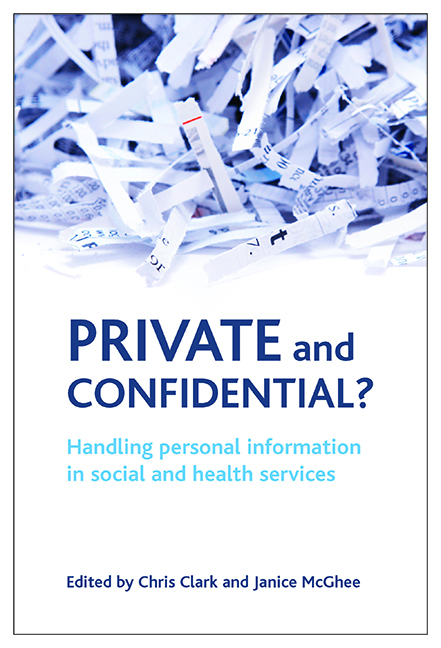eight - Confidentiality and information sharing in child protection
Published online by Cambridge University Press: 21 January 2022
Summary
Introduction
The direction of UK and Scottish government policy towards the promotion of ‘joint working’ between agencies and professionals and the advent of multidisciplinary teams has made information sharing more central to effective practice and service delivery. Tensions can arise, however, between differing professional guidelines (Crichton, 2001). In child welfare the importance of interagency cooperation and information sharing to protect children at risk of abuse and neglect is longstanding and is reflected in government guidance and interagency protocols and procedure including multiagency case conferences (Scottish Office, 1998; Scottish Executive, 2003; DfES, 2006a). The UK child protection system developed from the mid-1970s following the report of the inquiry into the death of Maria Colwell (DHSS, 1974) and emphasises investigation and surveillance combined with extensive procedural guidance, including that on sharing information (Waterhouse and McGhee, 2002). Effective practice to assess risk in relation to a child is seen as dependent on interagency cooperation and information sharing (Hallett and Birchall, 1992; DH, 1995); nevertheless, tensions do arise in practice.
It is not surprising that challenges in communication and information sharing between agencies and professionals have been consistently identified in inquiries and reviews into the death or serious injury of children in the context of abuse and neglect (see DH, 1991; Reder et al, 1993; Brandon et al, 1999; Sinclair and Bullock, 2002, for systematic overviews). More recent inquiries into the deaths of children identified continuing deficits in communication and information sharing (Hammond, 2001; Laming, 2003; O’Brien, 2003). In an audit and review of Scottish child protection arrangements agencies identified the need for better communication and sharing of information (Daniel, 2004). Joint inspections of safeguarding arrangements for children in England have illustrated that agencies (and professionals) are not fully clear regarding the information that can be shared, or can be ‘reluctant’ to do so (DH, 2002; CSCI, 2005).
A central challenge can be the issue of confidentiality and its interpretation. Respecting confidentiality is regarded as one of the basic values and requirements for an ethical approach in social work and other professions. It appears in various professional codes of practice and ethics (BASW, 2002; Scottish Social Services Council, 2005; GMC, 2006) and the ethical complexities are discussed in various texts (for example, Clark, 2000).
- Type
- Chapter
- Information
- Private and Confidential?Handling Personal Information in the Social and Health Services, pp. 149 - 168Publisher: Bristol University PressPrint publication year: 2008



